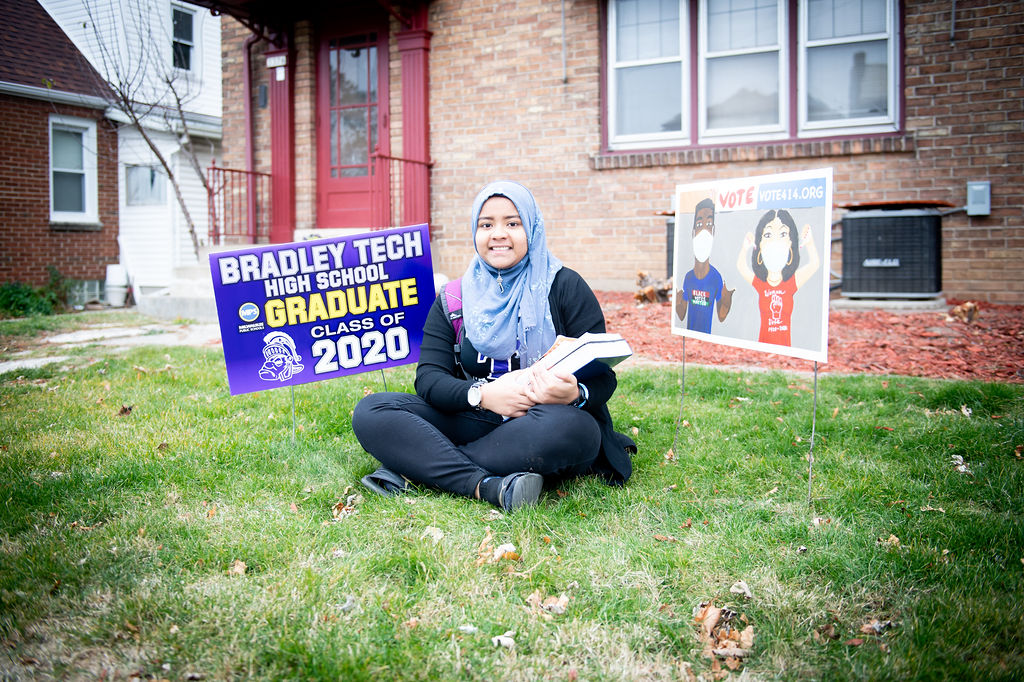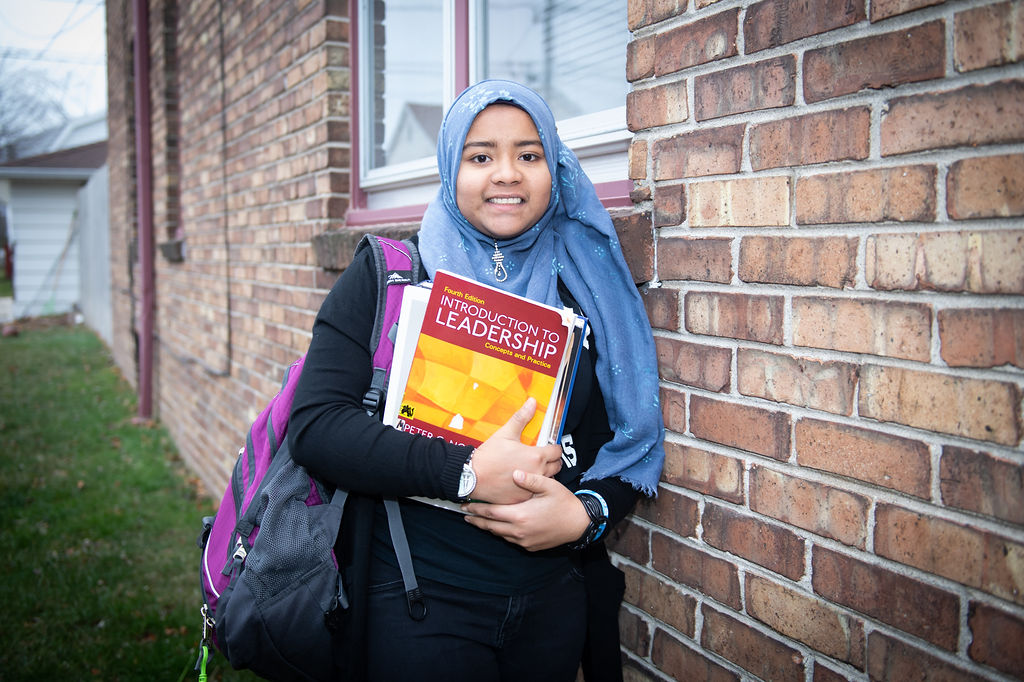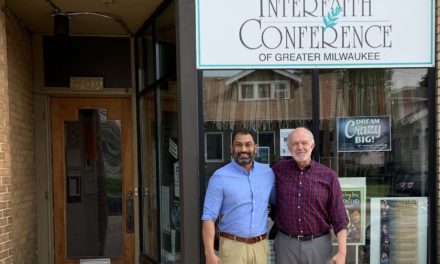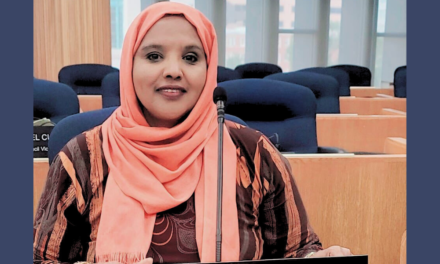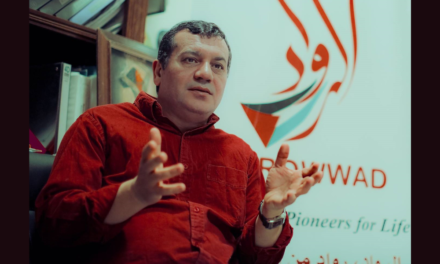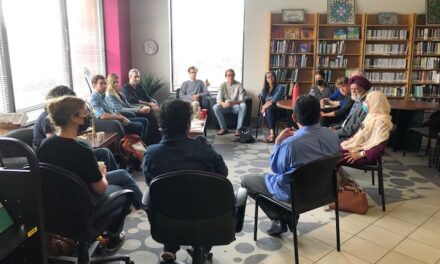Bibi Muhammad
Photo
When Bibi Muhammad, 18, came to Milwaukee from Malaysia in 2016, she was barely educated. Last June, she was the senior class valedictorian at Bradley Tech.
Bibi’s story of immigrant drive and accomplishment was broadcast on Spectrum News Channel 1. Now a student at UW-Parkside, she was born in Burma, where Muslim Rohingya like her and her family were deprived of legal rights under the Burmese constitution and expelled from their homes by the military.
“A lot of Muslims got killed in Burma,” Bibi said. Her family moved to Malaysia with then four-month-old Bibi because they believed it would be “somewhere safe.”
In Malaysia through a program established by the United Nations High Commissioner for Refugees, the family was documented. Nevertheless, Malaysia, “never valued us,” Bibi said.
Since her parents were not Malaysian citizens, they were often harassed by the police. “My dad needed to work,” Bibi said, but when he tried to, the police threatened him with the jail. “We had to bribe them,” Bibi said. “My mom went to prison for a while.” In addition to the police harassment, “we were mocked by the Malaysian people too.”
Rohingya, who have their own language, were barred from attending school with Malaysian children. “I went to refugee school, which is the lowest. You learn A, B, C, D and in math, you learn how to multiply and divide – basic stuff,” Bibi said. “I went there until sixth grade. Here, in sixth grade, you learn a lot of stuff.”
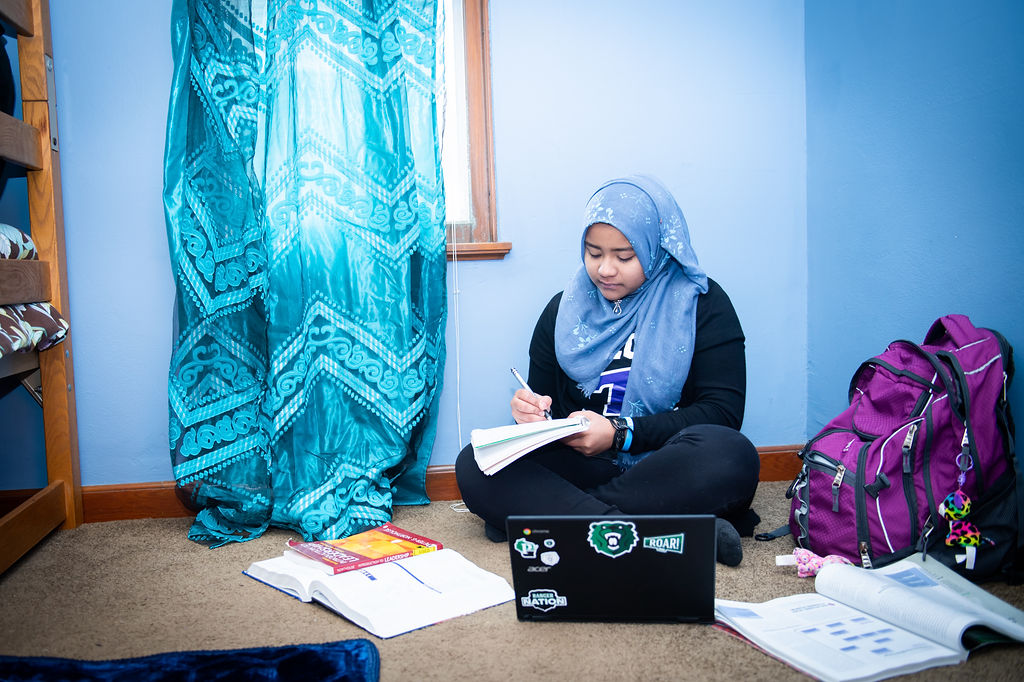
Bibi and her family were able to endure these hardships because of their strong faith in Islam. ”I really love and enjoy my religion,” Bibi said. “I am supposed to pray five times a day. [But] sometimes I pray more than I have to because I want more from God. God is first, second are my parents, and third is myself.”
Life in Milwaukee brought many positive changes to Bibi’s family, not least the opportunity for Bibi and her brothers to attend public schools on an equal basis with other students. “I went to Bradley Tech as a new freshman,” Bibi said. The Bay View high school had just started an ESL (English as a Second Language) program. “From that class, I became super comfortable. That teacher spent a lot of time with us just to improve our English skills.”
Bibi’s ESL teacher, Emily Rivera, said, “Bibi was very motivated to learn, her work ethic was excellent, and she tried to take advantage of as many extra-curricular as she could.” Among other extra-curricular, Bibi participated in sports, joining the school’s tennis program. She even became the manager of the wrestling team.
And Bibi was soon able to help other newcomers to the United States. “That first year we had students from many different countries, Iraq, Somalia, Malaysia,” Rivera said. “Bibi became a leader.
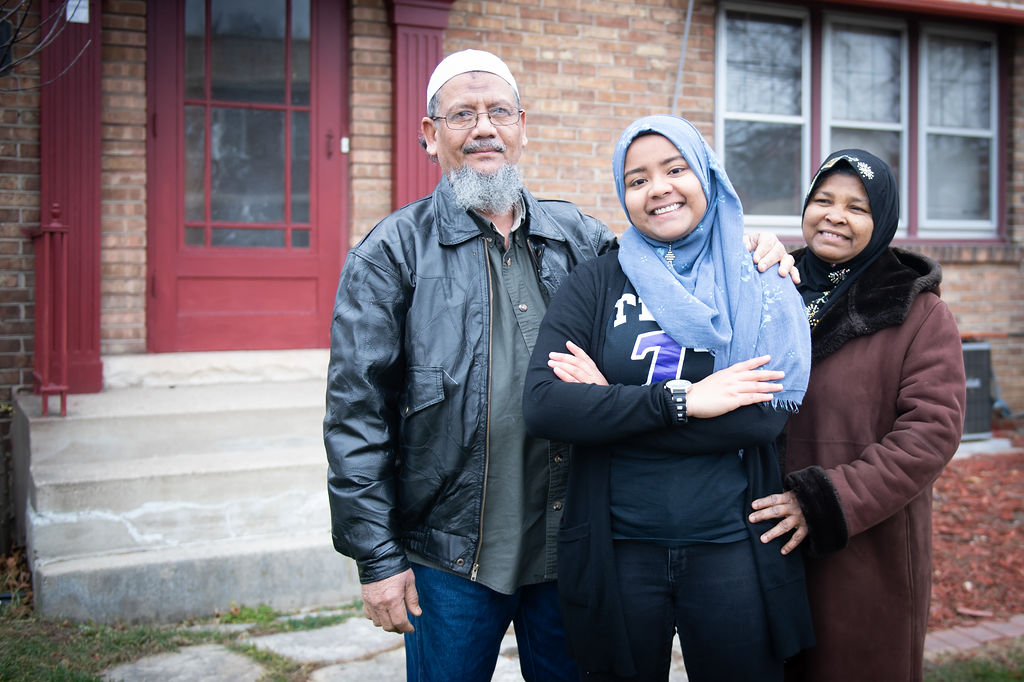
The Muhammad Family
She knew what it was like to be a new student, so when others came, she was one of the students showing them around the school and helping to translate, helping them get adjusted.”
And once Bibi became an upper classmen, she continued to help newcomers. “She would still be helping the new students who came because she knew what it felt like,” Rivera said.
Yet no one could have predicted Bibi’s outstanding performance. After a first semester of average or below grades, Bibi’s improved so rapidly that she became the top student at Bradley Tech. “I’m probably blest by God,” she jokes. And she adds that she is lucky to come from a strong family with parents who care about her. “But there are cultural perspectives” that had to be overcome, she said. In the Rohingya culture, education is not necessary for girls. And Bibi’s parents were nervous about her attending a co-educational school. “They don’t like me talking to guys, actually,” Bibi said.
But those were not the only cultural hurdles. “In high school, I was bullied,” Bibi said. “I was disrespected by other kids because I was wearing hijab and eating different foods from them.”
One day, Bibi was eating during a class where it was allowed, when the teacher said, “It smells so bad. Put it away.” Bibi was eating durian chips, a food made from dried fruit, now widely available in the U.S.
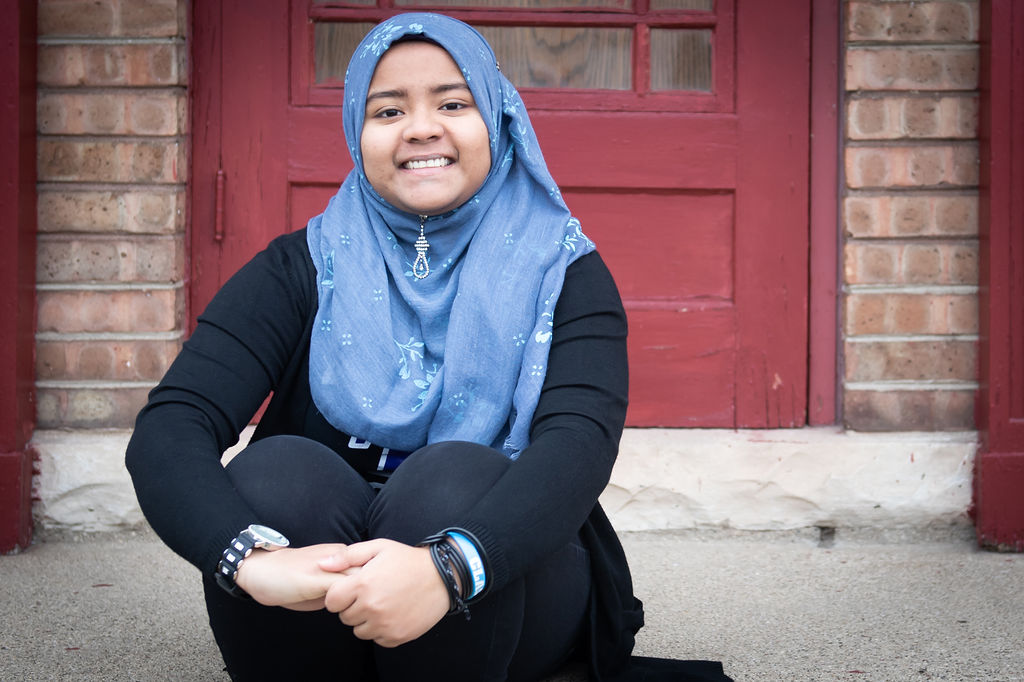
“I cried after that,” Bibi said, though not in front of the teacher. She talked to two of her other teachers, who helped her work through it. “I loved all the teachers from Tech. We built a strong relationship.” Even the teacher who criticized the smell of her durian chips “was a good teacher,” Bibi said. “Most kids don’t even know how to connect with their teachers. I’m lucky that I have teachers who want to build a relationship with me.”
And eventually, the atmosphere at school changed. “I had to open people’s minds a little bit,” Bibi said. “I explained to them how my culture is and how I do things differently than they do it. Including not just food, but also wearing a hijab.”
Though things improved, “There are some [who are] prejudiced and ignorant. I also took my hijab off after being mocked by other kids.” Now she says she wears hijab only on special occasions “because I don’t want to lose friends.”
But she did wear her hijab at Bradley Tech’s virtual graduation ceremony in June. “That was the point where I was going to show my parents that I can become a successful person as a woman,” she said.
In Rohingya culture, “there is no encouragement to achieve any education” especially for women. “They just don’t expect females to go out there to achieve whatever they want to become successful. They don’t see value in women at all.”
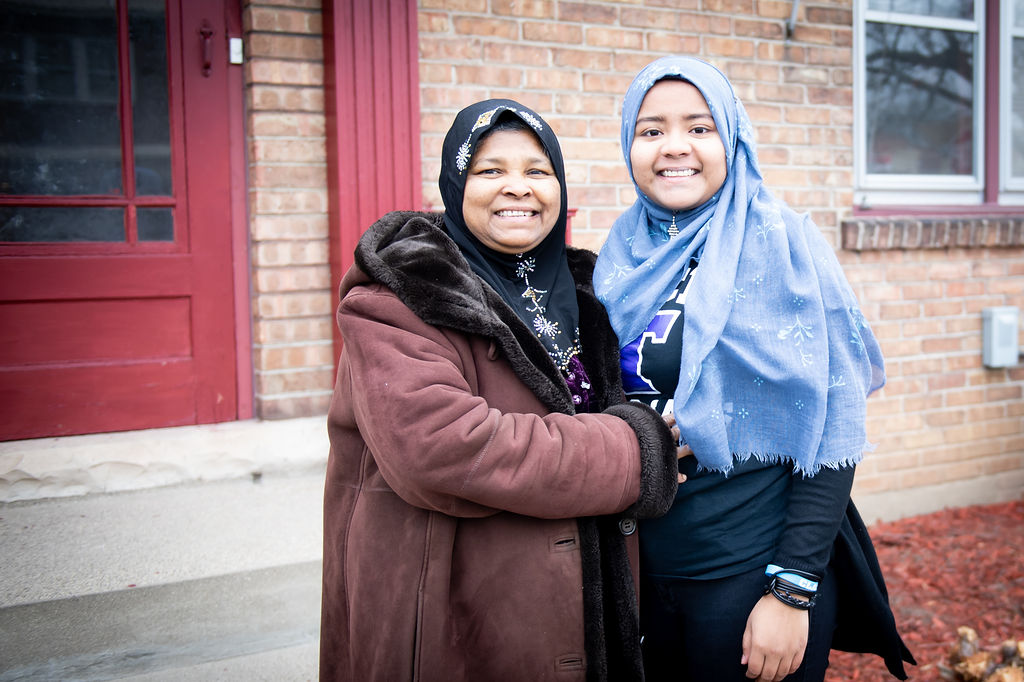
Bibi and her mother Marbiah Yusuf
Today, Bibi’s mother, Marbiah Yusuf, says that she is proud of all her daughter is accomplishing. With Bibi as a translator, Marbiah said that she “has no words to describe how happy she is” for her daughter’s scholastic success.
Through Bibi, her mother said, “All my life has been hard, difficult.” Marbiah said she “couldn’t even explain how hard it was, but after coming to America, it became easier.”
Bibi’s favorite subject has always been math. At Parkside, she majors in math and computer science and hopes to eventually attend graduate school. “My intent is to break out of my cultural expectations and to have a career in computer science,” said the young woman who came to Milwaukee knowing only the basics.
